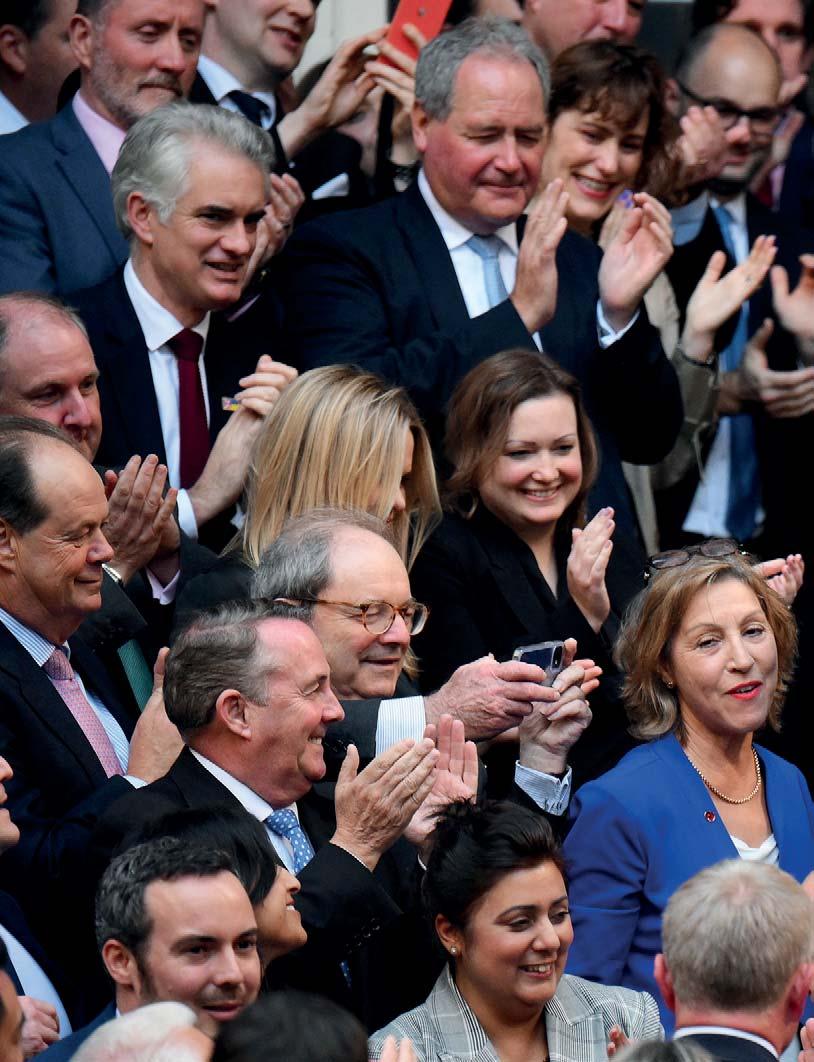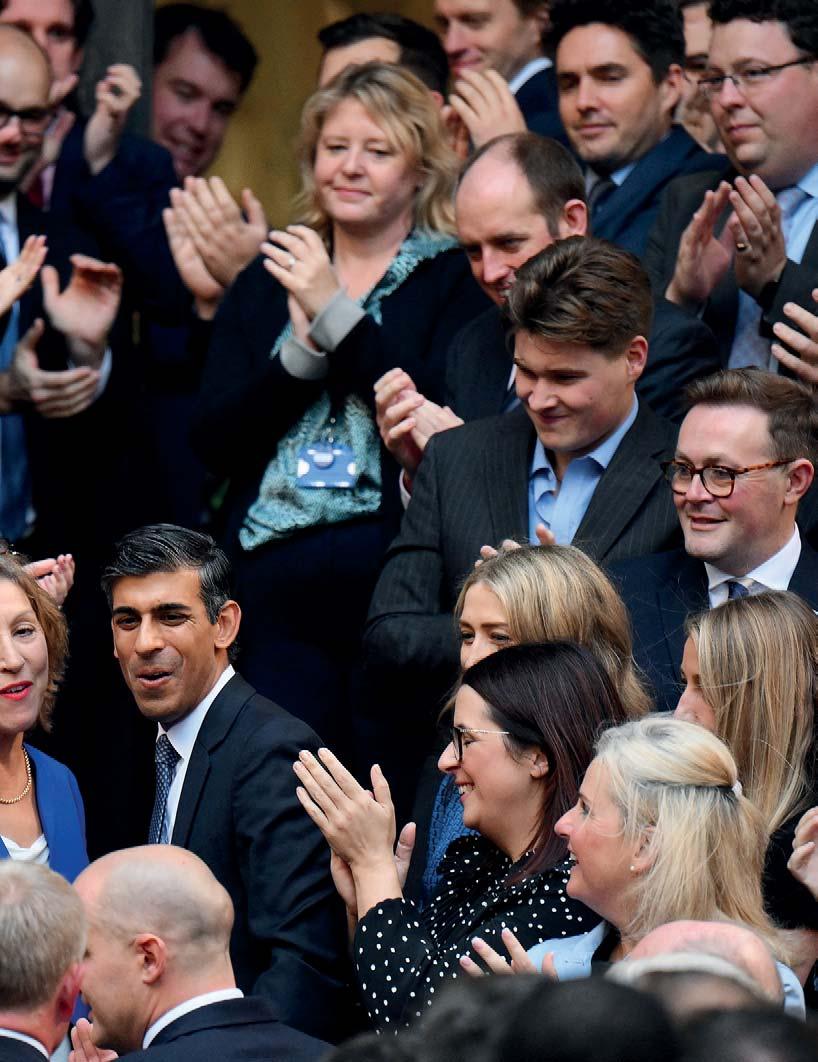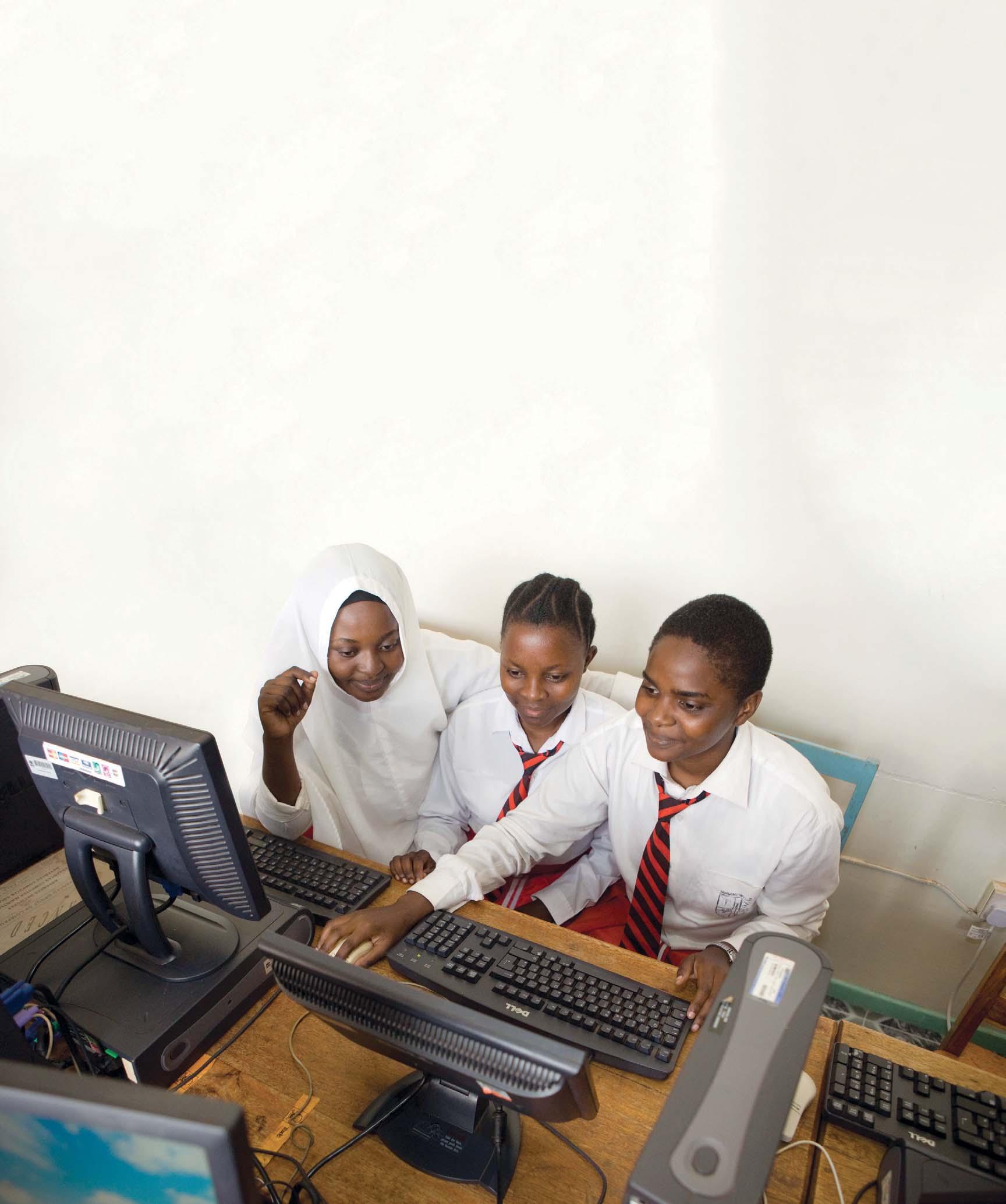
11 minute read
The turning point in UK race relations
The elevation of Rishi Sunak, whose origins are African and Asian, to the highest office of the land is an extraordinary turnaround of history and entrenched views. The UK Cabinet today has an African complexion, something inconceivable only a couple of decades ago. What does this mean in the context of the UK’s future direction?
Is Sunak the turning point in UK culture?
Advertisement
Letter from London
Clayton Goodwin
Many years ago, former US Secretary of State Dean Acheson said that Britain had lost an empire but not yet found a role. Not much change there, then, except that British politicians and the electorate have spurned the roles that were available to them.
The Commonwealth? The European Union? Alone in the wilderness? Only the last-named appeals to them. Perhaps the new Prime Minister, with his heritage in three continents, may be able to see things from a diff erent perspective.
All this has come about as the newly-acclaimed King Charles III contemplates the challenge to the United Kingdom, and to the concept of Englishness (along with its cherished qualities and practices), which
We have been witnesses to the making of history. The unchallenged appointment as UK Prime Minister of Rishi Sunak, the fi rst non-White holder of this prestigious offi ce, has stood British politics entirely on its head. It came after a summer of unprecedented turmoil following the resignation of Boris Johnson as leader of the most right-wing nationalist government the country has had in modern times.
The turn-about in the Conservative Party has been so radical that the keys of No. 10 Downing Street, the power bastion of what was once the British Empire, have been handed to a man whose parents were born in Africa – Kenya and Tanzania respectively – whose faith is Hindu, and whose family roots lie in the Punjab, India.
And it did not so much as raise a quibble from the party which included until not so long ago such famed racially-minded polemicists as Enoch Powell and Norman Tebbit, and their political heirs, among its parliamentary membership.
It has been, indeed, an African season, in which the recent UK Cabinet has had a very African complexion. At one time, three of the four great offi ces of state – Chancellor, Foreign Secretary, Home Secretary – were held contemporaneously by Africans. Now the Premiership itself has fallen to the son of Africans.
The advance into the heart of government was fi rst evident in the leadership contest which followed Johnson’s resignation. Outsider Kemi Badenoch, declaring her candidacy early, set the pace which forced her rivals to toe the Brexiteer line.
Suella Braverman, also a leadership candidate, took the same tack. Kwasi Kwarteng and James Cleverly waited to inherit the reward for backing the right horse, (interim leader) Liz Truss, even though that horse then fell at the fi rst fence. It seemed to be Africans / Asians all the way, and once that genie was out of the bottle the stopper could not be put back in.
Bellicose jingoism
Whatever happens now, the culture crusade – against statues, and wokery (formerly known as political correctness) – will be maintained, by the media as much as by the politicians.
There will be the fl ag-waving and bellicose gestures over Ukraine, Taiwan, or anywhere else, because nothing quite masks the baleful consequences of Brexit – ill-devised and ill-directed economic policies, the tearing of the country apart, and an absurd level of incompetence at the top of government – than a foreign adventure.
without his mother’s seasoned hand at the tiller, has been coming apart before his eyes.
Margaret Thatcher would not recognise the party and government which has modelled itself on her perceived image. Nor would the millions in the electorate who voted these same politicians into power at the last general election in 2019 on a Brexit platform, the purpose of which was seen to have been mainly to keep England, well, English. (Our Celtic confrères did not go down that route.)
The policy remains the same but the defi nition of Englishness has changed. Money and class have conquered cultural background, or, rather have enabled some Africans (and Asians) to acquire the culture
Below: Rishi Sunak being greeted by colleagues on his arrival at Conservative Party Headquarters in central London after winning the vote to become the new Prime Minister
Africans are involved at all levels of management and operation, as much as African athletes are expected to dominate the track.
Ama Agbeze, then Britain’s netball captain, was among a number of sporting heroes invited to watch Wimbledon from the Royal Box in 2019. Here, she is presented to the crowd
of the elite. Labour and the Liberal Democrats, parties considered traditionally to be champions of the under-privileged and under-represented, have been caught on the wrong foot in diversity at the highest level.
The accession of a new monarch, in turn, raises the question of whether this country would be better off as a republic. My own position is ambivalent – or, at least, it was.
In a perfect world I would prefer to have a President who signifi es the best of the nation and I am impressed by how some of our near-neighbours have chosen the most worthy of their citizens to represent the state. That choice shows the world how a country sees itself, and how it wishes to be seen by others.
At a lesser level, in my youth the village beauty contest – not pageant (that is something entirely diff erent) – did the same thing. The election of a South African (non-White) as Miss Longfi eld, the representative of our village, in 1967 – the year before Enoch Powell’s infamous speech and of cricket’s D’Oliveira aff air*, which led to the sporting isolation of apartheid South Africa – said more about our values than any number of speeches made by politicians and councillors.
Unfortunately, the United Kingdom lacks the maturity to elect a President. The political parties would muscle in on the act and create division and ridicule. Could we trust an electorate that brought us, inter alia, Brexit and Boris Johnson?
King Charles may yet fi nd himself, whether willingly or not, cast as the counterpoint to the humiliated government system and the discredited politicians. Dramatist George Bernard Shaw made a similar point in his play The Applecart. And historically, it was the monarch, not the public or any amount of progressive academics, who got rid of the Fascist dictator Benito Mussolini.

Another England
By coincidence, it was another play by Shaw, converted into the musical My Fair Lady, which dominated the London theatre’s summer season and showed that there is another England, away from the palaces and parliaments, in which an impoverished young girl can dream of rising above the poverty into which she was born and become accepted as a lady of the highest social stratum.
The message of this year’s production, tellingly portrayed, with the inspirational casting of Amara Okereke, born in Yorkshire to parents from Nigeria, in the starring role of Eliza Doolittle is that in today’s England that young girl could just as well be African as from any of the other cultures which make up our country.
Amara succeeded brilliantly in this most quintessential English play, in which her father, the impecunious dustman, Alfred Doolittle, was portrayed by Nigerian comedian Stephen K. Amos.
I attended the show with several senior members of the Caribbean Social Forum and saw how much they identifi ed with Eliza’s experiences and ambitions as representing their own. This was their England, as much as it was my England, and the England of anybody in the house. An England that is no longer as monochrome as it was in 1913, the year in which the drama is set.
The entry of Africans to the highest portals of political power hides the absence of appropriate representation at other levels of our national life, but it cannot be gainsaid. Everybody, here or elsewhere in the world, can look at our country’s political leadership and see Africans there, and in time it will become a natural association.
As her tutor Professor Henry Higgins said – or something like it – of Eliza Doolittle, we’ve grown accustomed to their face. When an African girl or boy born into poverty and disadvantage (along with their White / Asian counterparts) can aspire realistically as of a right to the opportunities and company of King Charles III, and, dare I say it, our new Prime Minister, I can only echo Eliza’s own words – Wouldn’t it be luverly!
* Basil D’Oliveira, a non-White South African, was banned by the Apartheid administration from touring his homeland with the England cricket team – thus leading to the international sporting boycott of South Africa.
If women participated in Africa’s economic activities to the same extent as men, the continent’s GDP would increase by 25%, or $8trn annually. But for women, as well as Africa’s burgeoning youth population to become economically eff ective, it is essential that they become fi nancially literate. Elisa Desbordes-Cissé and Florence Raes look at how this can be achieved. Why fi nancial literacy for women and youth matters
The economic empowerment of Africa’s youth and women is probably the main enabler of achieving most of the sustainable development goals, especially the targets for zero poverty, zero hunger, gender equality, decent work and economic growth and reduced inequalities. This is why Ecobank Foundation and UN Women have joined respective agendas for promoting women’s empowerment in Africa.
At Ecobank, giving back to the communities in which the Bank operates is embedded in the DNA of the Group. For the past nine years, through the Ecobank Foundation, Ecobank’s employees have participated in ‘Ecobank Day’, an annual event where they serve the wellbeing of their communities.
This year’s Ecobank Day, which took place on 12 November, focused as a key factor in reducing poverty and promoting shared prosperity for women and youth, mostly in marginalised communities, with the theme “Leave no one behind: Financial Inclusion for all!”
Through this partnership with UN Women, particular attention has challenges faced by women and women entrepreneurs in both rural and urban areas in this year’s Ecobank Day.
The Ecobank Foundation and UN Women will also jointly carry out a series of awareness raising, advocacy and action activities to combat violence against women and girls in several African countries in conjunction with the international 16 Days of Activism Against Gender-Based Violence campaign starting on 25 November.
Economic empowerment
Economic empowerment is the transformative process that allows youth and women to move from limited power, voice, and choice at home and in the economy to having the skills, resources, and opportunities needed to compete equitably in markets.
When more women work, economies grow. Women’s economic empowerment boosts productivity, income equality in addition to other positive development outcomes.
If women participated in the economy identically to men, it would add up to $8trn, or 26%, to annual African GDP in 2025 compared with a business-as-usual scenario.
With more than 60% of Africa’s population under the age of 25, ensuring that all young people, including the most marginalised and disadvantaged, can unlock their potential through access to education, training and then decent jobs will boost the economies. It is particularly relevant for Africa where the Fourth Industrial Revolution and the rise of the digital economy opportunities.
products tailored for women and youth have – to some extent – many people across the continent, allowing many of them to start or improve their business. Which is great news! But how to ensure that the economic gains last? To quote
South African actress, Pearl Thusi, in the 2022 documentary ‘I’ve Been
Trying. Eight Years Without a Job’:
“If we really want young people activities, it’s important to provide
Financial literacy is the ability to budgeting, and investing. It is the ability to understand how money works. It is the ability to make sound
Financial literacy is essential
Because women are more inclined to invest in the wellbeing of their children and family,it is crucial they need to do so. Financial literacy is, therefore, central to reducing poverty and boosting prosperity.
We all face moments in our life when we are forced to stick to a stricter literate, we are able to be better prepared and more resilient when the next crisis comes along.
How to ensure women and youth more inclusive and accessible while also removing the stigma attached to way that people are taught to read, write and count, they should learn how
Education and training
Financial literacy is achieved through education and training. It is very in childhood and it should continue throughout life.
Financial inclusion is a key enabler to reducing poverty, boosting prosperity and facilitating seven of the seventeen Sustainable Development Goals (SDGs).
In sub-Saharan Africa: • 74% of the unbanked only have a primary education or less • 62% of the unbanked live in rural areas • 40% of the unbanked are young adults aged 15 to 24 • women are more likely than men to be unbanked to budget and save. That is the reason why we strongly programmes. By doing so, women and youth, mostly in marginalised communities, can be empowered to will change their lives and those of their families in the long run. inclusion, no one is left behind. Elisa Desbordes-Cissé Foundation Florence Raes Director ad interim and Deputy Regional Director, UN Women West and Central What is Ecobank Day?
Since the inaugural Ecobank Day in 2013, Ecobank employees have supported a variety of causes and shown compassion for the welfare of our various local communities.
Led by the Ecobank Foundation, previous initiatives have focused on orphanages, cancer screening, education, maternal healthcare, safe water supply, malaria prevention, and our three-year Together for Better Health campaign - addressing the Non-Communicable Diseases of cancer, diabetes and mental health disorders.
Below: Female secondary school students attending a computer class in Bukoba, Tanzania, East Africa











